Economy
CBN, banks sell $9.9bn as naira collapses to N1,670/$
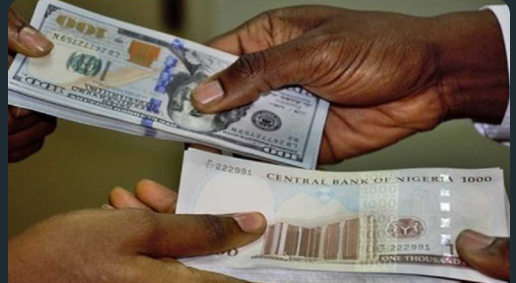
By Mario Deepromoter
The value of foreign exchange turnover via the Nigerian Autonomous Foreign Exchange Market increased to N15.74tn ($9.90bn) in August 2024, an FMDQ report has stated.
This came as the Central Bank of Nigeria revealed that foreign inflow into the country increased to $585m in the same month.
Also, at the official market on Tuesday, the value of the naira dropped to N1,658 against the United States dollar from the N1,659 it sold on Monday while black market sellers sold at the rate of N1,670.
The CBN said the impressive turnover via the Nigerian Autonomous Foreign Exchange Market represents a significant month-on-month increase of 33.88 per cent, equating to an additional N2.51tn from July 2024’s turnover of N13.23tn ($7.39bn). value of foreign exchange turnover via the Nigerian Autonomous Foreign Exchange Market increased to N15.74tn ($9.90bn) in August 2024, an FMDQ report has stated.
This came as the Central Bank of Nigeria revealed that foreign inflow into the country increased to $585m in the same month.
Also, at the official market on Tuesday, the value of the naira dropped by N1 to N1658 against the United States dollar from the N1,659 it sold on Monday while black market sellers sold at the rate of N1,700.
The CBN said the impressive turnover via the Nigerian Autonomous Foreign Exchange Market represents a significant month-on-month increase of 33.88 per cent, equating to an additional N2.51tn from July 2024’s turnover of N13.23tn ($7.39bn).
This surge reflects heightened trading activity and investor engagement in the foreign exchange market.
Commercial banks, CBN, and international oil firms are the major sellers of forex at NAFEM.
According to the financial markets monthly report for August published by the FMDQ and obtained by our correspondent on Tuesday, the increase in turnover was driven by the increase in T.bills, OMO Bills, and FGN Bonds transactions, while transactions in other bonds recorded a MoM decrease of 18.43per cent (N10bn).
Despite this increase, the naira experienced continued depreciation, contributing to increased exchange rate volatility.
The report read, “Spot FX market turnover was $9.90bn (N15.74tn) in August 2024, representing a 33.88 per cent ($2.51bn) MoM increase from the turnover recorded in July 2024 ($7.39bn).”
It also stated that total secondary market turnover on FMDQ Exchange was N40.43tn, which represents a MoM increase of 31.97 per cent (N9.79) and a YoY increase of 128.57 per cent ( 22.74tn) from July 2024 and August 2023 figures, respectively.”
The FMDQ added that foreign Exchange and Money Market transactions dominated secondary market activity, jointly accounting for 69.98 per cent of the total secondary market turnover in August 2024.
In August, the naira traded within a range of 1,543.84 to N1,617.08, indicating heightened fluctuations compared to the previous month’s range of 1,500.32 to N1,621.12.
It said the average spot exchange rate rose by 1.68 per cent (N26.24) to close at N1,586.56, compared to N1,560.32 in July.
“In the FX Market, the Naira depreciated against the US Dollar, with the spot exchange rate increasing by 1.68 per cent ($/N26.24) to close at an average of $/ N1,586.56 in August 2024 from $/N1,560.32 recorded in July 2024.
“Further, exchange rate volatility increased in August 2024 as the Naira traded within an exchange rate range of $/N1,543.84 – $/N1,617.08 compared to $/N1,500.32 – $/N1,621.12 recorded in July 2024.”
This increased volatility underscores the challenges facing the Naira amidst ongoing economic pressures, including inflation and shifts in global market dynamics.
Last month, the Central Bank of Nigeria auctioned $876.26m to end users through 26 commercial banks in its latest effort to strengthen the ailing Naira.
This policy led to a temporary appreciation of the Naira against the US Dollar, with the exchange rate adjusting to N1,596.52/$ from N1,601/$.
The auction sold about $876.26m, aimed at alleviating rising demand pressures in the forex market and promoting price discovery.
The sales report highlighted that businesses in the manufacturing sector benefited significantly from the auction, securing dollars for importing spare parts, industrial raw materials, plain paper, pharmaceutical products, and equipment for breweries.
At the official market on Tuesday, the value of the naira dropped by N1 to N1658 against the United States dollar from the N1,659 it sold on Monday while black market sellers sold at the rate of N1,700.
Meanwhile, the CBN Governor, Olayemi Cardoso, has stated that the value of naira against international currencies cannot increase if the fundamentals of forex expenses are not addressed.
Cardoso, speaking at a press briefing at the end of the 297th Monetary Policy Committee meeting, revealed that Nigeria’s external reserves have increased yet again, reaching $39.07bn as of September 19, 2024.
He said since the strategy of the apex bank is to unlock as many diversified sources as possible into the foreign exchange section, it is not enough and can never replace the fundamentals.
He said, “The external reserve stood at US$39.07bn as at 19th September 2024 an increase of 17.4 per cent compared with US$33.28bn in the corresponding period of 2023. This represents 8 months of import cover for goods and services and 13 months of imports of goods only.”
“As of August, inflow from remittances was $585m and this is a big deal as it is 130 per cent for the corresponding period last year. These figures didn’t drop from the ceiling but our deliberate and calculated effort. We recognised that certain things were not happening. We liberalised the IMTOs and encouraged them to open accounts in naira and we are normally dealing with them regularly and this has incredibly paid off.
“But on the naira, I must tell you that since the strategy of the central bank is to unlock as many diversified sources. it is not enough and can never replace the fundamentals.”
The central bank governor further explained that as long as the country operates on a monolithic economy, achieving a strong exchange rate “that we all so desire” would continue to be hampered.
“Non-oil exports must also increase. Having an exchange rate that we all so desire will continue to be hampered. We need to diversify our economy to boost the naira. We may like to think or dream it can, but it can’t. Until the fundamentals are fixed and in place, you will continue to sub-optimise,”
“Oil production has got to be ramped up to the level that will carry the economy. I think we are all ongoing witnesses to the efforts that are being made in that sector. It has to happen. I spoke about the sad situation that we as Nigerians face today whereby we are a monolithic economy.
“We need to diversify our economy. There is so much that a central bank can do. Without the fundamentals in the right position, we will continue to sub- optimiser,” Cardoso added.
The CBN governor said Nigerians must find ways to achieve import substitution.
“It can not just be about import and we must be able to calibrate accordingly our taste for foreign goods,” Cardoso said.
“These are all things that will determine essentially where we settle in respect to our foreign exchange rate.”
He said the central bank is determined to play its part in ensuring that the market operates efficiently while warning that the apex bank is ready to penalise “those who play the market”.
Economy
Inflation surged to 24.23% due to escalating cost of living
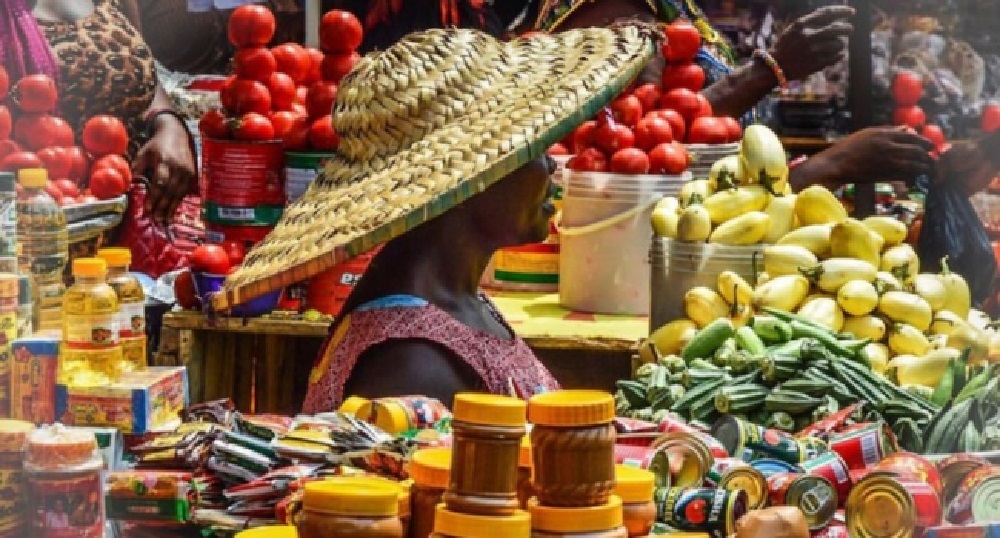
Inflationary pressure has reappeared as Nigerians grapple with increases in average costs of basic food items and energy.
For the first time after the rebasing of the Consumer Price Index (CPI), headline inflation spiked in March to 24.23 per cent – 105 basis points above the 23.18 per cent recorded in the previous month.
The National Bureau of Statistics (NBS) yesterday indicated that the rate of increase in the average price level was higher in March than the level in February.
In January, the NBS updated the weight and price reference periods in calculation of the CPI to make the inflationary gauge more reflective of changes in consumption patterns and the economy generally.
The rebasing did not only brought the base year closer to the current period from 2009 to 2024, it also introduced some critical methodology changes to improve the computation processes.
After the rebasing, inflation dropped from 34.80 per cent in the pre-rebased period of December 2024 to 24.48 per cent in January 2025. It dropped further to 23.18 per cent in February.
In its latest report, NBS recorded 186 basis points changes between the monthly inflation rate, with the month-on-month rate rising from 2.04 per cent in February to 3.90 per cent in March.
The NBS attributed the spike to the rise in costs of food and alcoholic beverages, fuels and electricity, among other items.
Analysts at CardinalStone said the resurgence was due to renewed foreign exchange (forex) pressures amid heightened global risk-off sentiment.
They pointed at foreign portfolio investments (FPIs) outflows and increased dollar demand, which saw naira dropping by 2.4 per cent in March.
Experts also cited increase in price of Premium Motor Spirit (PMS) or petrol, following the temporary suspension of the naira-for-crude swap arrangement.
Food inflation rate stood at 21.79 per cent in March 2025. The composite food index decreased to 21.79 per cent from 23.51 per cent.
Core inflation, which excludes volatile agricultural produce prices and energy, rose to 24.43 per cent from 23.01 per cent.
Specifically, the month-on-month food inflation rose by 50 basis points from 1.67 per cent in February to 2.18 per cent in March.
The NBS attributed the increase in food inflation to increases in the average prices of basic food items including ginger, garri, broken rice, honey, crabs, potatoes, plantain flour, periwinkle and pepper amongst others.
On a state-by-state basis, food inflation was higher in Oyo with 34.41 per cent; Kaduna (31.14 per cent) and Kebbi (30.85 per cent).
On the other side, the 9.61 per cent recorded by Bayelsa; Adamawa (12.41 per cent) and Akwa Ibom (12.60 per cent), were the lowest inflation rates.
Analysts expressed concerns that the resurgent inflationary pressure might lead to renewed tightening stance by the Central Bank of Nigeria (CBN).
CBN Governor Dr. Olayemi Cardoso, had at the end of the first Monetary Policy Committee (MPC) meeting in 2025, reiterated the apex bank’s commitment to orthodox monetary policies, noting that the apex bank’s stance will be reflective of the inflationary trend.
With inflation rate dropping in February, the MPC had decided to maintain all key monetary policy parameters, including the Monetary Policy Rate (MPR) at 27.50 per cent, the asymmetric corridor around the MPR at +500/-100 basis points, the Cash Reserve Ratio (CRR) at 50.00 per cent for Deposit Money Banks and 16.00 per cent for Merchant Banks, and the Liquidity Ratio at 30.00 per cent.
Clarifying the impact of the rebased CPI, Cardoso had explained that the lower inflation figure should not be misinterpreted.
He underlined the need to analyse more data before drawing comparisons, noting that the CBN is currently assessing the figures and will provide further guidance in due course.
The CBN boss stressed the critical importance of collaboration between monetary and fiscal authorities in sustaining recent economic improvements.
Addressing concerns about the impact of elevated borrowing costs on economic growth, the CBN governor assured that the apex bank’s primary objective is to stabilize the foreign exchange and financial markets.
He expressed confidence that such stability would attract increased foreign investments, stimulating the much-needed economic growth.
Cardoso also highlighted the competitiveness of the Nigerian currency, which has spurred growing interest from international investors.
Economy
SEE Current Black Market Dollar (USD) To Naira (NGN) Exchange Rate

The exchange rate between the US dollar and the Nigerian naira continues to draw significant attention from individuals and businesses alike, especially those involved in international trade and remittances.
On Saturday, April 12, 2025, activity in the Lagos parallel market, commonly known as the black market shows that the buying rate for one US dollar stands at ₦1570, while the selling rate is ₦1575.
These figures are sourced from traders and Bureau De Change (BDC) operators who are active in key currency exchange hubs across Lagos.
Why the Black Market Rate Matters
Although the Central Bank of Nigeria (CBN) does not officially recognize or support the use of the black market for foreign exchange transactions, many Nigerians still rely on it due to difficulties in accessing forex through official banking channels. Issues such as limited availability, long processing times, and strict documentation requirements have made the black market a more accessible, albeit riskier, alternative.
CBN’s Official Position
The CBN continues to warn against participating in parallel market trading, stating that such activities undermine the stability of the national currency. The apex bank urges those in need of foreign currency to apply through authorized financial institutions, which are mandated to follow official exchange rates.
Nonetheless, the disparity between the official and unofficial markets persists, often influenced by market forces such as demand, inflation, and fluctuations in Nigeria’s foreign reserves.
Latest Exchange Rates Overview
Black Market (Parallel Market) Rate
Currency Pair Buying Rate Selling Rate
USD/NGN ₦1570 ₦1575
CBN Official Rate
Currency Pair Highest Rate Lowest Rate
USD/NGN ₦1630 ₦1570
Key Notes for Forex Users
The exchange rates in the black market often differ slightly from one location or dealer to another due to market volatility and negotiation margins.
Rates can also fluctuate within hours based on economic news, government policies, and global financial trends.
It is advisable to compare rates from multiple sources before conducting any large transactions, especially in volatile markets.
What This Means for Nigerians
The current forex rates reflect continued pressure on the naira, and many analysts believe that inflation, reduced oil revenue, and inconsistent monetary policies are key factors driving the demand for the dollar. For everyday Nigerians, this means the cost of imported goods remains high, and businesses dependent on international suppliers face growing challenges.
Until forex supply stabilizes through official channels, the black market will likely remain a major player in Nigeria’s currency landscape.
Economy
CHECK Exchange Rate As Naira Weakens More In Parallel Market

Naira has continued its downward slide in the parallel market on Thursday, exchanging at N1,621/$1, a depreciation from N1,580/$1 recorded just a day earlier on Wednesday.
This represents a N41 decline in 24 hours, deepening concerns among traders and economic watchers about sustained volatility in the FX market.
While the official exchange rate stood at N1,644.00/$1 on Wednesday, according to figures published on the Central Bank of Nigeria (CBN) website, there was no updated official rate published by the CBN several hours after the market close on Thursday.
Meanwhile, market participants at Wuse Zone 4 in Abuja attributed the persistent depreciation to a resurgence in speculative activities, unmet demand from importers, and lingering confidence issues in the foreign exchange market.
Alhaji Aminu Gwadabe, President of the Association of Bureau De Change Operators of Nigeria (ABCON), attributed the ongoing volatility in the forex market to a mix of local and global uncertainties. In a message sent to Nairametrics, he stated:
“The volatility, fears, happenings, and shocks in both the local and international markets called for disdain.
President Trump’s tariff announcements have sent markets into panic, loss of confidence, revenue losses, and budget reviews.”
He added that despite ongoing interventions by the CBN, instability persists.
“As usual, the CBN, being a catalytic actor, must continue to ensure stability through timely interventions. However, volatility remains a challenge and needs to be more comprehensively addressed,” Gwadabe said.
He further called for an expanded policy transmission mechanism to better serve the retail end of the FX market.
“It is therefore necessary for the CBN to reevaluate the efficacy of that Policy transmission mechanisms and expand its scope to the BDCs retail segment of the market to cater for the needs of the critical retail needs of invisible transactions where the BDCs pose the most potent tool of the CBN policy transmission mechanism.”
Dr. Muda Yusuf, CEO of the Centre for the Promotion of Private Enterprise (CPPE), also linked the naira’s recent struggles to global developments and speculative pressures.
“This is not unconnected to recent policy signals from President Trump and global oil price movements. The market is heavily information-driven, and speculative pressure has spiked following the tariff announcements,” Yusuf explained.
“Now that Trump appears to be having second thoughts, we might even see a bit of a breather in the FX market,” he added.
Meanwhile, traders on the ground say the situation is being worsened by the uncertainty surrounding ongoing government reforms and inconsistent access to official FX windows.
“The demand today was unusually high, especially from small businesses that can’t access the banks. It’s putting pressure on our supply,” a trader at Abuja’s Wuse Zone 4, who asked not to be named stated.
The spread between the official exchange rate of N1,644/$1 and the parallel market rate of N1,621/$1 narrowed slightly on Thursday, a sign that some convergence may be taking place, despite persistent volatility.
Market analysts warn that unless the CBN resumes consistent interventions or significantly boosts FX liquidity, the naira may continue to face downward pressure in the weeks ahead
The continued slide of the naira, despite heightened CBN interventions, signals persistent challenges in Nigeria’s FX liquidity and structural demand-supply mismatch.
-
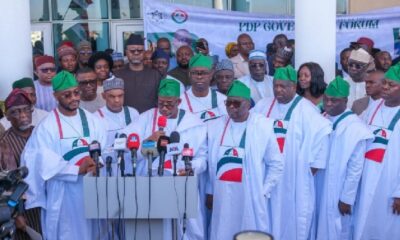
 News19 hours ago
News19 hours agoPDP governors declare support for Tinubu
-

 News23 hours ago
News23 hours agoEx-finance minister rearrested in new fraud probe
-

 News20 hours ago
News20 hours agoHope for Nigerians as Dangote refinery slashes petrol price again
-
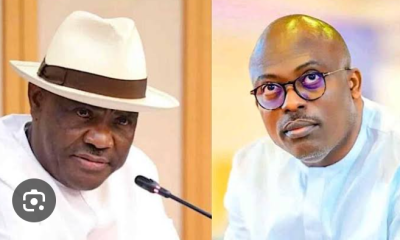
 News22 hours ago
News22 hours agoFubara: How can I forgive somebody who never requested for it– Wike
-

 News20 hours ago
News20 hours agoRivers Emergency Rule: Abbas inaugurates 21-member panel
-
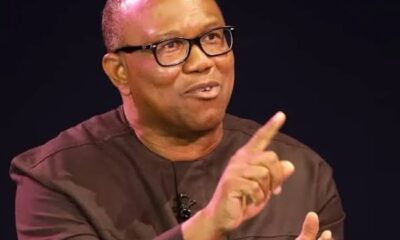
 News22 hours ago
News22 hours agoPeter Obi asks president Tinubu to suspend France trip
-

 News19 hours ago
News19 hours agoN1.3trn CBEX Scam: EFCC caution Nigerians against Ponzi Schemes
-

 News6 hours ago
News6 hours agoFG expresses sympathy for CBEX victims, urges a united effort to combat Ponzi schemes






